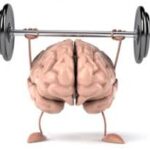Most sport psychologists work with athletes on the mental side of their sport in an office setting (usually one hour per week), providing them with mental tools that they can use during training and competitions. This approach makes about as much sense as a coach offering their athletes technical instruction and then telling them to go out onto the field, course, court, or what-have-you and work on it in practice. In either case, the transfer from inside to outside isn’t very good.
I have found the most productive work I do with athletes is during their actual practice sessions. I’m able to go to training with athletes and show them how to incorporate mental skills, such as intensity, focus, imagery, and routines, while they’re actually practicing.
But, over the last few years, I have discovered an even better setting in which athletes can begin to develop their mental skills: the gym. Yes, using mental skills as a part of your physical conditioning program is a great way to begin to ingrain those skills that will be of such benefit in the quality of your training and when you compete.
Think of it this way. Both a drill in practice and, for example, a set of squats are physical performances that share many attributes. They both involve strength and technique. They hurt, especially at the end. And, most importantly, they require certain mental skills to maximize the gains you make from them.
A great thing about beginning your mental skills development in the gym is that it is a much less complex environment than in training and, as a result, it is easier to practice and learn the mental skills. You have fewer variables, fewer things to think about, and, importantly, fewer distractions that can prevent you from focusing on and practicing the mental skills.
Practice, competition, and conditioning exercises also have similar phases of execution. There is the preparation phase where you get yourself physically and mentally ready to perform your best. There is the performance phase where you are doing your best to perform at your highest level possible. There is the conclusion phase where you may be in pain and your body is telling your mind (often in a very loud voice!) to either ease up or stop because it hurts too much. Finally, there is the completion phase where you evaluate your performance and see what you can do to improve.
Everything mentally that you need to have and do for practice or in competition also applies to every set of a workout. You must be highly motivated to give your best effort even when you get tired, bored, or begin to really hurt. You have to have confidence that you can, for example, lift a certain weight or do a particular number of reps. You need a certain mindset to perform the exercise well, for example, an aggressive mindset to attack the lift or a calm mindset for stretching. You must have the high intensity necessary to explode upward with the weight in a lift or the low intensity to get the most out of yoga. You have to be focused on good technique so you execute properly and don’t risk injury.
The foundation of this idea that mental training begins in the gym is that mental skills are skills that only develop with practice. Further, your ultimate goal in all of your training, whether physical, technical, tactical, or mental, is to deeply ingrain effective skills and habits that you can use on the day of a competition to perform your best.
Now that I’ve convinced you (hopefully) of the value of using mental skills in the gym, you’re probably wondering how exactly you can begin to include mental skills training into your workout regimen. Here are five key mental skills you can incorporate into your conditioning that can then transfer over to your practice and competitive efforts.
Commitment
For you to get maximum gains from your conditioning, you must want it bad. Before each exercise, make a conscious commitment to put your best effort into it from start to finish. This commitment is particularly important at the end of a set when you need to finish strong in the face of the inevitable pain you feel.
Confidence
Say something positive that will give you a confident state of mind toward the exercise(e.g., “10 reps at 225 lbs., I can do this!”). This is especially important when doubts creep into your mind when you are, for example, doing a new exercise that you’re not that skilled at or you’re going to be attempting a weight you’ve never lifted before.
Mindset
Particularly in strength training, a passive mindset just isn’t going to get the most out of your conditioning. In a way, you’re competing against the exercise; it wants to stop you from, for example, lifting the weight or completing the required number of reps. You have to attack the weight and impose your will on it. Otherwise, near the end of the set, your body will tell your mind to stop and your mind will listen. You must keep an aggressive mindset from the first rep to the last.
Intensity
Many sports-related exercises are about strength and agility, both of which require intensity to get the most out of them. Before every set, “rev your engine” by jumping up and down, taking some aggressive breaths and using “psych-up” self-talk (“Let’s do it!). When you are doing low-intensity exercises, such as stretching or yoga, relax your muscles, breath deeply, and use “psych-down” self-talk (e.g., “calm and easy”). If your body is at ideal intensity for the exercise, you’ll do it well from start to finish and you’ll gain the most benefit from it.
Focus
Simply put, if you’re not totally focused on your best execution and effort in an exercise, you will not only not perform it well and gain its greatest benefits, but you may also hurt yourself. Before every set, stop talking to people, take a deep breath to direct your focus onto the exercise, take 5-10 seconds and imagine yourself doing the exercise well, and, finally, grab a keyword that reminds you of an important thing you need to do to perform the exercise well (e.g., “reach” or “attack”).
Because mental skills are new and not a part of your conditioning routine, you’ll probably forget to use them sometimes. Don’t beat yourself up about it if you don’t remember every time. At first, you’ll need to be reminded to use the mental skills every set. I would recommend taping a sheet of paper on the wall or mirror of your workout space saying something like, “MENTAL SKILLS!). When you see it, you’ll be reminded to do it. And before you know it, the mental skills will become so ingrained that you use them automatically without needing reminders.
There are several great benefits to using mental skills in the gym. First, because you will be more mentally prepared for your workouts, you’ll give more effort, have more quality in that effort, and, as a result, you’ll make greater gains in your fitness. Second, you’ll be able to work on the mental skills before you get to practice, making that transition faster and smoother in incorporating them into your training and competitive preparations. Finally, once you are using mental skills in your physical conditioning, training, and pre-competitive routine, you’ll ingrain them so deeply that when you get to that big event, all of those mental skills will come out and they’ll enable you to perform your very best.






